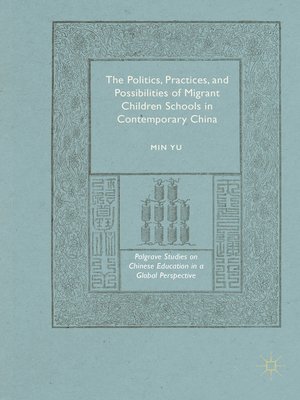The Politics, Practices, and Possibilities of Migrant Children Schools in Contemporary China
ebook ∣ Palgrave Studies on Chinese Education in a Global Perspective
By Min Yu

Sign up to save your library
With an OverDrive account, you can save your favorite libraries for at-a-glance information about availability. Find out more about OverDrive accounts.
Find this title in Libby, the library reading app by OverDrive.



Search for a digital library with this title
Title found at these libraries:
| Library Name | Distance |
|---|---|
| Loading... |
Winner of the AERA Division B Outstanding Book Recognition Award
This book examines the dynamics surrounding the education of children in the unofficial schools in China's urban migrant communities. This ethnographic study focuses on both the complex structural factors impacting the education of children attending unofficial migrant children schools and the personal experiences of individuals working within these communities. As the book illustrates in careful detail, the migrant children schools serve a critical function in the community by serving as a hub for organized collective action around shared grievances related to issues of education, employment, wellbeing, and other social rights. In turn, the development of a collective identity among teachers, students, parents, and other members in the migrant communities makes it possible for activists to begin to working to address multiple forms of discrimination and maltreatment while simultaneously moving towards the possibility of more profound social transformation.
This book examines the dynamics surrounding the education of children in the unofficial schools in China's urban migrant communities. This ethnographic study focuses on both the complex structural factors impacting the education of children attending unofficial migrant children schools and the personal experiences of individuals working within these communities. As the book illustrates in careful detail, the migrant children schools serve a critical function in the community by serving as a hub for organized collective action around shared grievances related to issues of education, employment, wellbeing, and other social rights. In turn, the development of a collective identity among teachers, students, parents, and other members in the migrant communities makes it possible for activists to begin to working to address multiple forms of discrimination and maltreatment while simultaneously moving towards the possibility of more profound social transformation.







